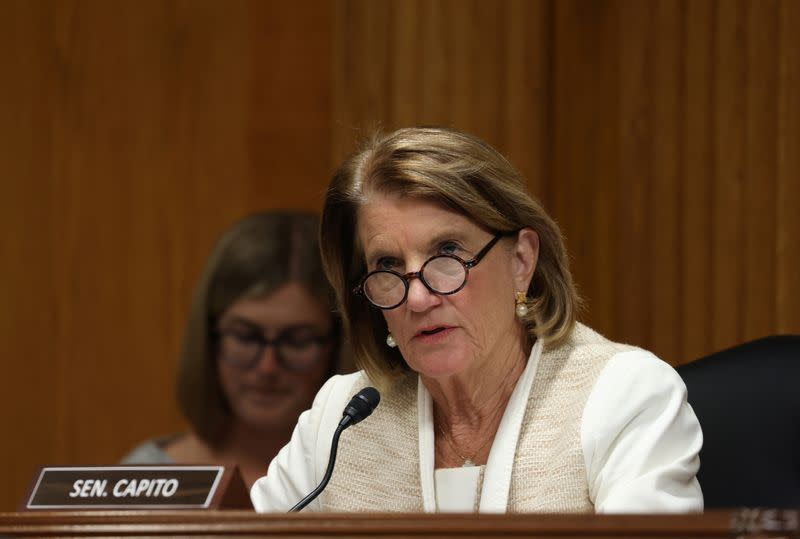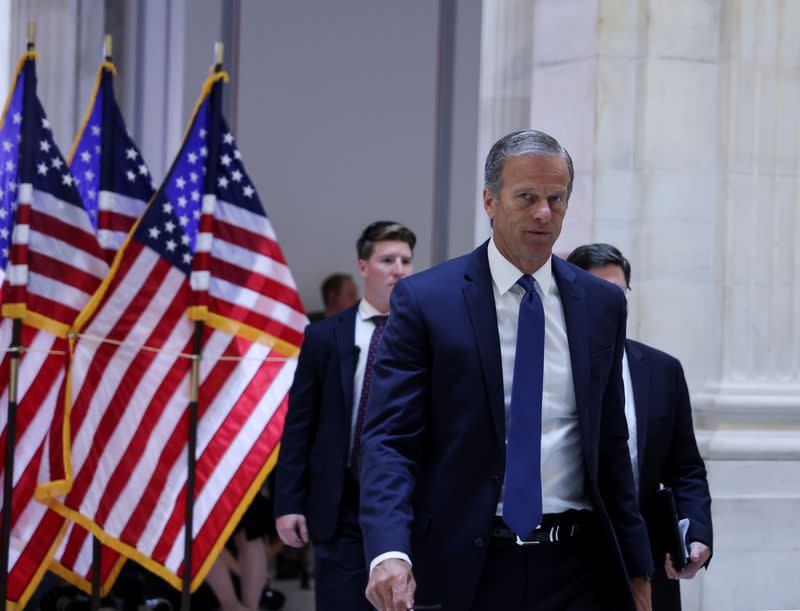U.S. Senate Republicans to discuss details of new infrastructure plan
- Oops!Something went wrong.Please try again later.
By Susan Cornwell and David Morgan
WASHINGTON (Reuters) -U.S. Senate Republicans are due to hear details on Tuesday about a bipartisan proposal to revitalize America's roads and bridges, which lawmakers believe could win support from the caucus as a part of President Joe Biden's sweeping infrastructure plan.
Members of a bipartisan Senate group will discuss the proposal with Republican senators at their weekly policy lunch, Republican lawmakers and aides said on Monday evening.
"We'll be discussing it," Senator Bill Cassidy, a member of the group, told reporters. "It won't be a formal sort of 'OK - now we need your vote.' It'll be more kind of 'OK - here's more information for you.'"
The bloc of Senate moderates, five Republicans and five Democrats, said last Thursday that it had reached an agreement after negotiations between Republican Senator Shelley Moore Capito and Biden broke down.
It proposes to spend $974 billion over five years, or $1.2 trillion over eight years, a source familiar with the package said. That is below Biden's current $1.7 trillion proposal and it is unclear whether it can gather enough support to pass the 50-50 Senate.
Senator John Thune, the chamber’s No. 2 Republican, told reporters that he expects Republican support for the proposal.
“I don't know how many Democrats they can get for something like what they’re talking about. But I think there would be substantial Republican support," he said. “It's good work."
Senator Dick Durbin, the chamber's No. 2 Democrat, said he had urged senators to "get this moving." He said any bipartisan deal, as well a separate measure Democrats are eyeing to try to pass their remaining infrastructure priorities without Republican support, would need to get in shape by the end of June because of a tight floor schedule.
Biden has set his sights on infrastructure legislation that would both revamp the nation's roads and bridges as well as boost spending on services including healthcare and childcare - although Republicans reject the idea that those latter priorities even qualify for the label "infrastructure."
The bipartisan plan unveiled last week sticks tospending on physical infrastructure like roads and bridges, members have said. House of Representatives Speaker Nancy Pelosi, a Democrat, expressed some skepticism about it on Sunday, saying it would be a hard sell to her party unless Democrats can be assured that there is "more to come."
TWO TRACKS?
Senator Mark Warner, a Democrat in the bipartisan group, said on Monday its plan contained $579 billion in new money over five years, which he said was almost double the amount of new money that Capito put forward.
“We think that meets the kind of once-in-a-lifetime, or once-in-a-generation investment in infrastructure," Warner told the Washington Post in a livestreamed interview.
There was scant information on how the proposed spending would be funded. Warner mentioned using unspent COVID-19 relief funding as well as better tax enforcement and "public-private partnerships".
Warner said the plan would have over $100 billion in efficiency investments, helping to address climate change efforts - a top priority for many Democrats.
Democrats have discussed moving on two tracks, a bipartisan package and then following up by pushing through a second spending measure using a process called reconciliation, which bypasses Senate rules requiring 60 votes to advance most legislation in the 100-seat chamber.
Republicans contend that Democrats could have a tough time getting support for reconciliation from moderate party members including Senator Joe Manchin, who is part of the bipartisan group.
But Senator Jeanne Shaheen told reporters that she and the four other Democrats behind the bipartisan proposal - including Manchin - could support a second reconciliation package.
"It's my understanding that everybody has said that they could support reconciliation in some form. Now, the devil is in the details, as we know," she said.
(Reporting by David Morgan and Susan Cornwell; Editing by Scott Malone, Peter Cooney and Jane Wardell)



